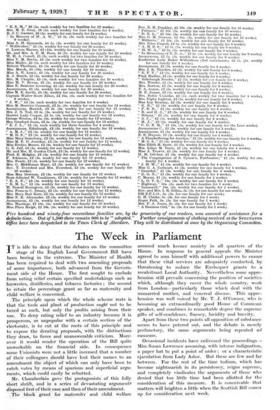The Week in Parliament
TT is idle to deny that the debates on the committee stage of the English Local Government Bill have been boring in the extreme. The Minister of Health has been required to deal with two amending proposals Of some importance, both advanced from the GoVern- ment side of the House. The first sought to exclude from rating relief ,certain specified undertakings such as breweries,' distilleries, and tobacco factories ; the second to retain the percentage grant so far as maternity and child welfare is concerned.
The principle upon which the whole scheme" tests is that the took and Plant -of production ought not to be taxed as such, but only the profits arising from their use. To deny rating relief to an industry because it is prosperous, or unpopular with a certain section of the electorate, is to cut at the roots of this principle and to expose the derating proposals, with the distinctions they draw, to fierce and unanswerable 'Criticism. More- over it _would render the operation of the Bill quite unworkable on the financial side. In consequence some Unionists were not a little incensed that a number of their .colleagues, should have lent their names to an amendment the object of which can only have been to catch votes by means of spurionS and superficial argil; ments, which could easily be rebutted.
Mr. Chamberlain gave' the protagonists of this folly short _shrift, and in a series of devastating arguments disposed first of their case and then of their amendment. The bloek grant for maternity and child. welfare aroused much keener anxiety in all quarters of the House. In response to general appeals the Minister agreed to arm himself with additional powers to ensure that these vital services are adequately conducted, by threatening to reduce the Exchequer grants to 'a recalcitrant Local Authority. Nevertheless some appre- hension still prevails concerning the position of societies which, although they cover the whole country, work from London-particularly those which deal with the unmarried mother, and venereal disease. This appre- hension was well voiced by Mr. T. J. O'Connor, who is becoming an extraordinarily good House of Commons speaker, and combines in remarkable degree the supreme gifts of self-confidence, fluency, lucidity and brevity.
Apart from these two points all opposition of substance seems to have petered out, and the debate is merely perfunctory, the same arguments being repeated ad nauseam.
Occasional incidents have enlivened the proceedings- Miss Susan Lawrence assuming, with intense indignation, a paper hat to put a point of order ; or a characteristic ejaculation from Lady Astor. But these are few and far between. For the rest of the time tedium, which has become nightmarish in its persistency, reigns supreme, and completely vindicates the arguments of those who denied that too little time had been allotted for the consideration of this measure. It is conceivable that matters will brighten a little when the Scottish Bill comes up for consideration next week. A profound calm broods over the general political scene, and seems unlikely to be disturbed for some time to come. Neither in the sphere of foreign affairs nor in domestic politics can a ripple be discerned on the water. The reverberations of the Anglo-French pact have died away in the glutinous phrases of the Foreign Secretary and the American Ambassador. The • appointment of the new reparations committee has brought European diplomacy to a temporary standstill. Peace reigns in industry. Relief work in the mining areas proceeds. Nevertheless, shrewd observers are watching the horizon with some anxiety, and find the atmosphere a little too oppressive.
WATCHMAN,









































 Previous page
Previous page